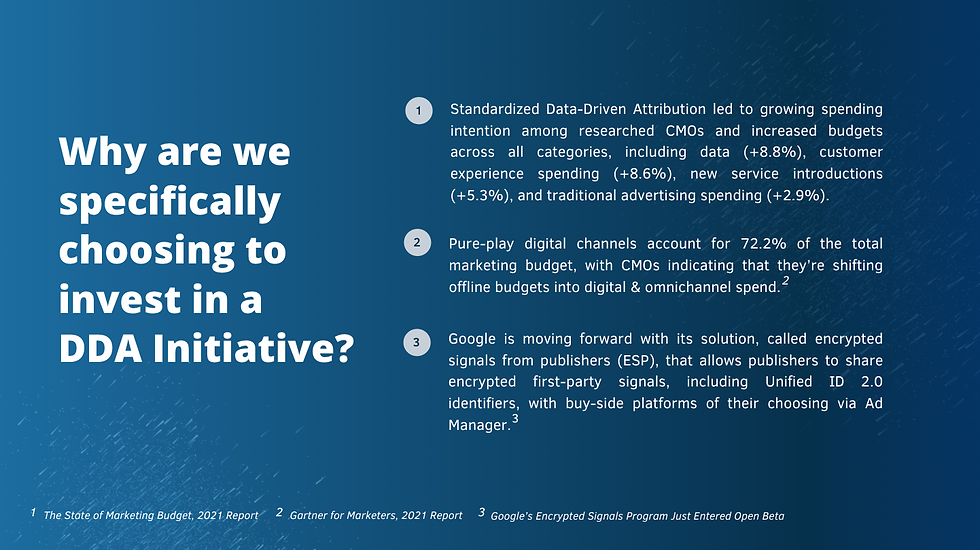Working with 99/DiDi, B2B
- Vini Apoena
- Nov 3, 2020
- 6 min read
Updated: Dec 1, 2020
Business Case performed by Vini Apoena in São Paulo, Brazil from January-2018 to March-2019 as Chief Strategy Officer of the French consulting firm, ESV Digital Groupe.

It's always exciting to work with scaling-up companies. The environment for tests, growth & innovation is totally different.
After an extremely competitive bid, my team and I won the opportunity to help build a new digital acquisition channel from scratch for 99/DiDi.
All the way through concept a new set of revenue strings, including deploying a House Agency on-site and dealing with groundbreaking project changes - straight to providing a brand new scalable & profitable digital acquisition journey.
99/DiDi hired it all. So we did it all.
Read the story.

1. Help to replace the workforce of human sales executives & shut down their commission program by developing & launching an automatic onboarding journey for new clients through a dedicated digital channel;
2. Provide qualified traffic through SEM, Social, Local & any other type of relevant channel that could be proved efficient;
3. Settle a creative workforce, together with a performance media team on-site at 99/DiDi's headquarters in São Paulo. Their work would be focused on creating a fast-track delivery of project tasks straight to operation - so the execution of these production tasks could jump from days to hours. This type of operation is also called House Agency.
4. Provide C-level consulting for scaling-up areas as CRM, Media Buying, Live Events & Partnerships - enabling 99/DiDi's execs to better execute their management by providing a better understanding of the digital scenario.
5. Manage the P&L of the project together with 99/DiDi's executives, provide detailed reviews & financial presentations to stakeholders in Brazil (99) & China (DiDi) by keeping all operational costs into a high-level audit program developed exclusively for 99/DiDi.
Let's do it.

Even the (now quite obvious) interpretation that in order to be scalable the unit would necessarily need to get rid of sales execs & become self-service came with the help from new people brought before the project even exists.
While we needed to change the business model in a collective effort to turn the unit profit, we also know that we were about to open & develop several new careers.
It wouldn't be enough to provide traffic through paid media. This kind of artifice can't supply enough engagement to convert new clients organically.
A pinch of paid media? Good. Depending on them? Don't do it. Thank me later.
That's why we needed a creative team. Putting content out there for our buying persona to engage & entertain. Timing is key for social media so an on-site agency (that wasn't initially considered) - started to look like a good path for us to walk.
Creativity wasn't our only reason to think about going on-site. Expectations with emerging technologies for media services went through the roof. They were really demanding so only highly-technical people would properly manage it for us. Attribution also started to become a thing back then.

Reversing the track back to where the message spreading started helped us achieve a better knowledge of how much pressure applies to each point of contact. It was easy to provide accountability to 99/DiDi's because of how transparent and cartesian our dashboards were.

It's now common sense that tech companies like Facebook, Google & Twitter built their business model around enhancing distribution for brands. It's true for content. It's true for performance. Budget policies for media expenses must consider pushing content towards the ideal customer profile (ICP). When I say pushing content towards ICP it's not just about buying the media. You can include promoting events. Sponsoring festivals. Activating the urban ground in order to reverse the concept of content creation.
While we choose to use the conventional sales funnel we knew in our heart that the last stage (conversion) would take every drop of our sweat to work properly. We draw the infra to try it all: active calling, SMS, bots, physical letters, surprise gifts, onboarding ads, modern promo mechanics, stylish events, onsite parties at 99/DiDi's headquarters... you name it.
Brazil's a continental country. What works in POA will probably not work in GRU. 99/DiDi's built a national platform so we had to address almost every Brazilian capital. There's only 1 reasonable way to do this: the big ol' regular media. We set the budget to buy radio, TV, newspaper, malls & billboards to ensure coverage outside big cities.
Many people may think that our principal competitor here is Uber. That's wrong. 99/DiDi's main competitor was refunding. That torrential flow of receipts that HR needed to deal with on a daily basis. It was 90% of the problem.
To create better marketing, you better have a good CRM system. 99/DiDi's was already working with Hubspot (which I love dearly). Even though they were paying for the most expensive package of all, the teams were barely using 20% of the tool. That's a problem. We hired a specialized business indicated by Hubspot called Inbound Soul. Their work helped us jump from 20% to 100% usability of the Hubspot system.


I temporarily left my C-level seat and went full-time 99/DiDi. First, I started settling strategists to make the first deployments. Developers, project managers, CRM specialists, media strategists, all sorts of consultants for data science, growth, public relations, events, etc. Everybody steps in.

We escalate specialists from France & London to install an attribution system so we could better understand the customer journey without much work - data as a service (almost, it took us some time). Overnight, questions that we thought it would take weeks to answer "magically" appeared in a dashboard. That move gave us more confidence to move forward.
Partnered with Murabei we enable trials to predict when a passenger would stop asking for cars (churn phase). A groundbreaking digital asset developed exclusively for 99/DiDi's that was projected to put them at the top of their game - by applying the same system on the competitor's client base to serve arguments when they are about to churn, bringing them to 99/DiDi's.

About our main competitor: receipts. We dealt by leveraging the number of working hours to process all that paper. Many, many conversions came just because the client saw the brand as cool as their own friends. We also had a great strategy over Linkedin to connect with those professionals. More than just showing inefficiency, our proposition of studying each business to better serve their proposition helped us strengthen our relationship with HR professionals and their teams.

1. We remodeled and launched the new 99 Empresas platform with 100% digital onboarding intelligence. The ride-hailing corporate service started generating around 45% savings for customers when compared with refunds. Serving taxi & private rides all over Brazil, multichannel car-calling (app, web & central), end-to-end user security & providing data mined for managers to reduce costs with urban transportation. We also created a bonus program where 99/DiDi gifted employees with ride-credits as an incentive for using the 99 Empresas refund system.
It's important to note on this goal that 99/DiDi's doesn't make money out of new contracts. They profit by taking a bite out of each ride transaction. That was the main reason for us to get rid of the commission program. Of course, it wasn't enough.
To reach a profitable scenario it was essential to keep churn rates below 9%, rides per general clients above 2,3 per day & a strictly controlled LTV that took us some time to exponentially grow & overcome CAC.
We needed a reliable playbook because 99/DiDi was expanding operations over Latin America and we were leading the way for them. Our experiences would enable their service to expand in a faster way than it was before.
2. It was built an unprecedented structure of paid media for 99/DiDi's. The architecture featured then-innovative channels as DSA, DDA & tailor-made attribution mechanisms with an investment cap reaching + US$ 1MM. Designed to improve feedback accuracy & speedy by tracking every-single point-of-contact throughout the prospect journey.
3. 99/DiDi's House Agency started operating in February/2018 with 5 employees from ESV Digital Brazil. It grew and kept around 10/15 people working depending on the stage of the project. The contract forecasted support to any collateral needs from the operation and was headed, first, by me. Part of my job was to hire & train a replacement for me (so a could be back as ESV's CSO). Which I did. The House Agency was responsible for around 50% of all the work necessary to keep the unit up & running.

4. Because one more training would potentially sound boring to employees, I've chosen to work through Workshops. Specialists from CRM, Content, Creativity, UX/UI & Digital Media were personally chosen for the special job of providing occasional meetings with 99/DiDi's employees in order to advance their knowledge over critical issues as Usability and Conversion Journey.
5. 99/DiDi's business model profit from rides, not contracts with companies. Keeping this fact as a mantra helped us report +117% rides growth over a four-month analysis. The same cut delivered +105% GM growth, helping the company to reach the milestone of US$ 1MM revenue just some months after.
This type of business model relies solidly on churn & lifetime value. We were able to reach lower levels of exists by strongly relying on CRM, which included all types of content that you can possibly imagine - even training for managers to learn how to generate higher savings over corporate urban transportation. We did events with high-profile, public personas from every type of mainstream media. The mission was to make corporate riding cool, pleasant, safe & economic to every Brazilian company.
▀















Comments